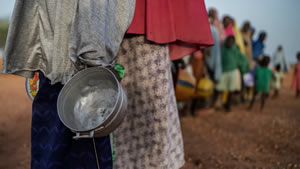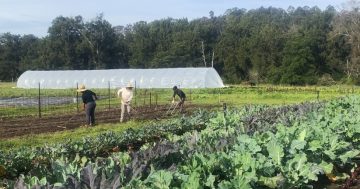Phoebe Sleet* says the COVID-19 pandemic is just one factor in a worsening global food security situation which is plunging many areas into famine.
 Despite decades of declining levels of hunger around the world, progress towards eradicating food insecurity halted in 2015 and has slowly worsened since then.
Despite decades of declining levels of hunger around the world, progress towards eradicating food insecurity halted in 2015 and has slowly worsened since then.
From 2016-to-18, increases in hunger were gradual. Then the increase went from 678.1 million undernourished people in 2018 to 687.8 million the following year.
In much of the world, decreasing food security was caused by an increase in conflicts, particularly those exacerbated by climate shocks.
In countries that did not experience conflict, weaker economic conditions reduced access to food among the poor, boosting rates of insecurity.
In 2020, the COVID-19 pandemic and outbreaks of locusts have had repercussions for food security that were impossible to predict.
The pandemic has undermined food security in several ways.
Measures taken to contain the virus have limited access to markets and fields, creating localised spikes in food prices and reducing access to food among the poor.
Containment measures have also reduced the availability of jobs and incomes, further preventing vulnerable groups from accessing food.
In Iraq, for example, efforts to prevent the spread of the virus were somewhat loosened in April, but job and income losses have remained high.
As of June, only 23 per cent of Iraqis reported working as normal and incomes had fallen by 40 per cent.
Similar situations have limited access to food in countries around the world.
While the situation has been especially acute in urban areas, movement restrictions have also created shortages in agricultural labour, which may contribute to food price increases.
While the impact of COVID-19 on global food security has been profound, it has not been the only contributor.
A huge plague of locusts has threatened food security, especially in East Africa, South Asia and parts of the Middle East, while large outbreaks of fall armyworm have persisted in much of Africa and South-East Asia.
Control efforts in both cases are being slowed by COVID-19 control measures.
Similarly, extreme weather has threatened crops and pushed up food prices in several parts of the world.
Several major exporters, such as the United States, Russia and Brazil, have faced droughts this year, while floods have destroyed crops in much of South-East Asia.
Crop prices have risen by 28 per cent since April and wheat prices are the highest they have been since 2014.
With food prices rising, the United Nations has warned that its worst-case scenario prediction may come to pass, a scenario in which around a tenth of the world’s population will experience elevated hunger levels.
As the global food security situation seems set to continue worsening and humanitarian needs increase, humanitarian agencies are increasingly struggling to access the funds necessary to provide nutritional aid to the most vulnerable.
Increasing hunger has meant that the World Food Program (WFP) will need an additional $6.8 billion on top of the budget it had originally projected, despite not having enough to fund that original budget.
As a result, the WFP has been forced to scale back operations, even in severely food insecure countries such as Yemen.
The crises that have worsened food insecurity in 2020 have strained economies and aid organisations alike. It is a combination that all but guarantees that food security will continue to decline in the foreseeable future.
*Phoebe Sleet is a research analyst with the Global Food and Water Crises Research Program.
This article was first published on Future Directions International website.











